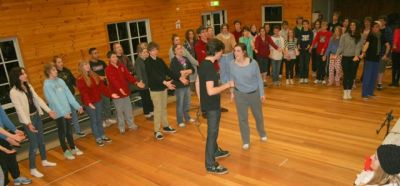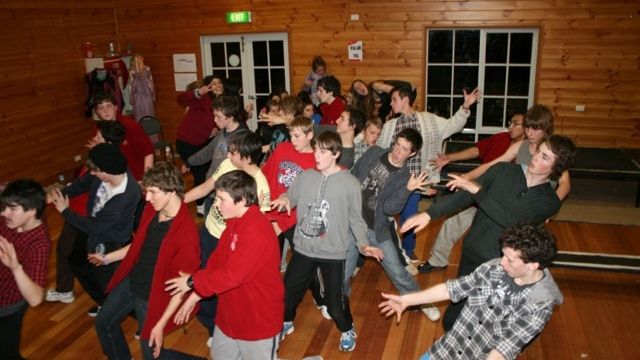Happy Rehearsal Campers at Ringwood
Struggling to get your cast focused? Perhaps the solution is go bush.
Production camps mean long days, hard work and very little sleep, but they can fire charge your rehearsal. In Melbourne’s eastern suburbs, Ringwood Secondary College has held an annual production camp since the 1980s. Lucy Graham visited this year’s camp to find out why they do it.
Singing can be heard from the dirt track leading to Mt Evelyn Recreational Camp at the foot of the Dandenong Ranges. It’s not rehearsal, but the dinner queue in the pine-lined dining room. More than 100 students from Ringwood Secondary College and a production team of 10 staff and two ex-students are into the second evening of a three-day camp. In three weeks Cole Porter’s Kiss Me, Kate will open on the school stage for eight performances.
Director of Performing Arts, Benjamin Moody is munching on fish n’chips. While his first involvement was in 2000 as a ring-in, this is his sixth camp as a production team member, and the first as director.
 ‘Unless you come away for three days, you don’t get an uninterrupted run through. The rehearsal hours for the chorus [on camp] are as many as we can get over the entire Tuesday night rehearsal period,’ he explains. ‘From my point-of-view, the distance we’ve come in the last 24 hours is quite phenomenal, and we still have two full runs to go.’
‘Unless you come away for three days, you don’t get an uninterrupted run through. The rehearsal hours for the chorus [on camp] are as many as we can get over the entire Tuesday night rehearsal period,’ he explains. ‘From my point-of-view, the distance we’ve come in the last 24 hours is quite phenomenal, and we still have two full runs to go.’
Year 12 student Shaun Dickson agrees. ‘At school we get a few hours a week, but at camp we have three days straight. There are no distractions, and there’s no going home. Everyone has their head in the zone.’
Cast member Mitchell Pirera’s loves seeing the show come together. ‘You get a glimpse of what its going to be like on stage. Socially you get to know everyone.’

India Brown, in Year 9, says ‘the camp shows us how good we can actually get’, while her companion, Caitlin Brown says camp ‘reminds us how close it really is, and gives us a new focus.’
Giorgia Deslandes believes the large blocks of time on camp mean the show starts ‘flowing really well, and we get each other better.’
In large part this occurs as the stakes are progressively raised. Tonight the orchestra and cast will combine for the first time. Tomorrow parents are invited to watch. Once back at school the show will be put on stage with costumes, set and props in two full day rehearsals, before the preview performance for local primary schools.
Student Verity Brown, a five-camp veteran, says the camp demands the consolidation of character. ‘I hadn’t fully formed my character until about half-an-hour ago,’ she laughs.
Dinner is winding up. There are announcements and housekeeping, the cooks are applauded, and students are urged to get more sleep – clearly a futile plea. Moody addresses the campers ahead of the evening run through: ‘You set a benchmark this afternoon, from which we will not go back.’
One of best aspects of camp is when students initiate their own mini-rehearsals in the breaks. And it is happening now. A dance rehearsal ignites in the foyer. A lone student pirouettes privately in a passageway. Others try their hand cracking the stockwhip, while the orchestra crams companionably into ‘the pit’, an alcove to one side of the rehearsal space.
The camp’s social value is becoming increasingly apparent to Moody. For the first time this year, vertical peer-groups have been in operation, connecting cast members across year levels, nourishing a sense of ‘collective pride’, an opportunity for ‘reminiscences’, ‘support’, and ‘setting the right tone’.
 Production camp thrives with the support of the wider school community. Students pledge to maintain the academic requirements of the classroom, and using the show as an excuse to miss work is frowned upon.
Production camp thrives with the support of the wider school community. Students pledge to maintain the academic requirements of the classroom, and using the show as an excuse to miss work is frowned upon.
As an onlooker, perhaps the most compelling justification for running a production camp is seeing students assume responsibility for the show’s success. This year there are two ex-students on the production team and two Year 10 students on costumes and stage direction. On the final day the students pack the equipment into the truck, with no teachers in sight. Here is a culture of ownership that has, at least in part, been nurtured by a positive and upbeat camp tradition.
Lucy Graham was a camper at RSC’s production camp in 1981, and has a son and two nephews in this year’s show.
Iriginally published in the September / October 2111 edition of Stage Whispers.
Lucy's review of the prodction.

